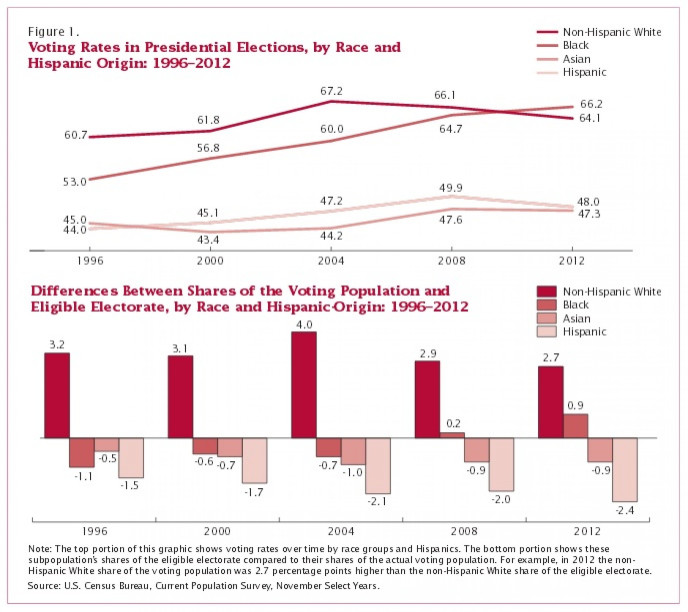What’s The Point Of Republicans Supporting Immigration Reform? Competition

Immigration reform in America is a numbers game. From the estimates of undocumented immigrants in the country to the number of votes needed to pass a bill in each chamber of Congress, to the amount of money the government stands to collect, the numbers matter. And they matter to both Democrats and Republicans, the latter probably even more so because they have been warned they need to win more Latino votes to remain a nationally relevant party.
Supporting immigration reform would likely increase the number of Latino votes for the GOP, a voting bloc experts and advocates agree is necessary for electoral success. However, supporting immigration reform alone doesn’t mean Latinos will automatically be drawn to the party. What it does is it ensures the party remains competitive.
“I think there is no question that if Republicans want to stop the bleeding, as it were, when it comes to losing Latino support, they have to do something to show that they are concerned about Latino interests and to strike a more moderate tone on immigration,” said Karthick Ramakrishnan, associate professor of political science at the University of California, Riverside.
Ramakrishnan, an expert on immigration reform and the politics behind it, said that at the national level, there is no short-term way for the party to start gaining significant number of votes among that bloc without signaling support for comprehensive immigration reform.
“At the very least, maybe we’ve hit rock bottom in terms of where the Republican Party is nationally with Latinos, but it could even go further below,” he added.
On Election Day 2012, 133 million Americans voted. Hispanic voters were 11.2 million of them, according to the U.S. Census Bureau, up more than 1.4 million from the 2008 election cycle. The number of Hispanic voters has been growing steadily with each election, nearly doubling from 2000. "The 2012 voting population expansion came primarily from minority voters," said the Census Bureau in a report.

More than 50 percent of young Hispanic voters identify as independents, according to a recent Gallup poll. But when it comes to an approach to immigration reform, they align more with Democrats than Republicans. Therefore, Republicans, should they choose to shift to the center on this issue, could probably swing many of these voters too.
It’s a possible outcome, said David Koelsch, who teaches law and runs the Immigration Law Clinic at the University of Detroit Mercy, but it will not be the majority of those votes. He argues that because Hispanic voters aren’t monolithic, Republicans stand a chance to make inroads and walk away with the votes of Latino religious conservatives, who share similar views with the party on issues like abortion and marriage.
“I really do think the Republicans have a chance to capture, depending on the district, 30 or 40 percent, and that’s how elections are won in this country,” said Koelsch. “Very few congressional elections are won in landslides. They are won by 3 to 8 percentage points, and if you’re able to swing even 25 percent of Latino voters in your district in your column, that makes for a winning election.”
Still, Republicans have consistently performed poorly among Hispanic voters, earning only about a third of their support. The only president to have done better than that was George W. Bush, who got 44 percent in 2004. Lifelong immigration reform advocate Sen. John McCain, R-Ariz., only got 31 percent of the Hispanic vote in 2008. Bush came close to overhauling the system in 2007, but found his efforts stymied by his own party’s opposition.
That opposition continues today, but with a feistier group of conservatives, the tea party, which is rejecting a special path to citizenship for the estimated 11 million undocumented immigrants. This form of legalization would take about 13 years, as written in the Senate immigration reform bill, meaning that if the bill is enacted, a new group of voters won’t come until the next generation.
And with the House refusing to take up the Senate's comprehensive bill, and Republicans facing a midterm election next year that is encouraging many to take intransigent positions, some say the prospects for a comprehensive immigration bill are as good as dead for 2013.
“They could’ve had a Republican president sign something that had the support of Republicans in Congress, and conservatives on immigration mobilized and defeated that possibility,” Ramakrishnan said. “It’s unclear when we are going to see the next opportunity for that to occur.”
Perhaps 2014 then, in time for the next White House race in 2016.
“The pressure is on. Republican national figures are really putting the heat on them,” Koelsch said. “If it doesn’t happen in 2013, 2014 is a great year for immigration reform. … Undocumented immigrants and their allies, we’ve been waiting a long time for this. What’s another year?”
© Copyright IBTimes 2024. All rights reserved.






















